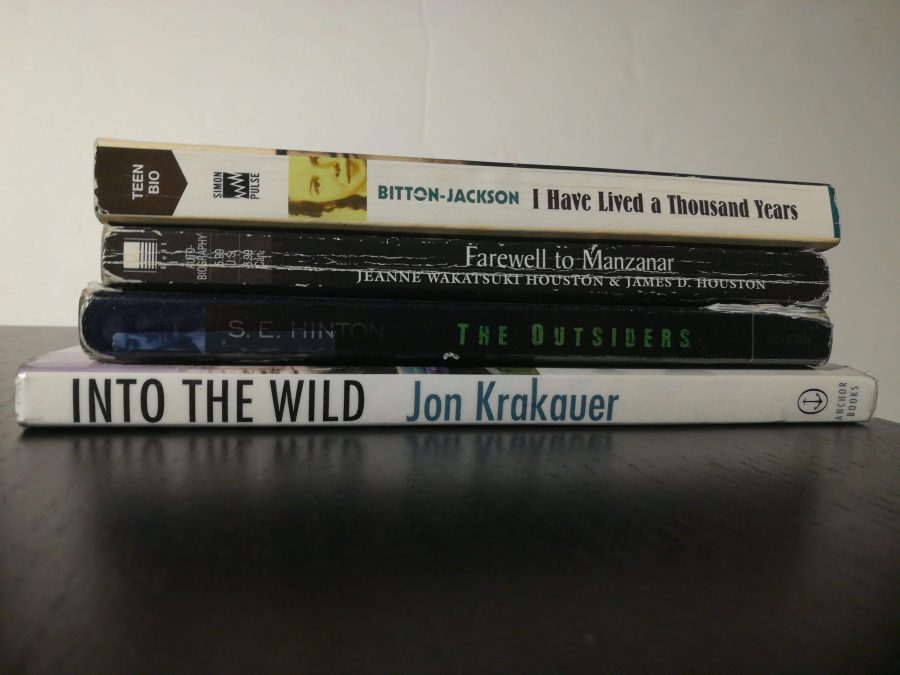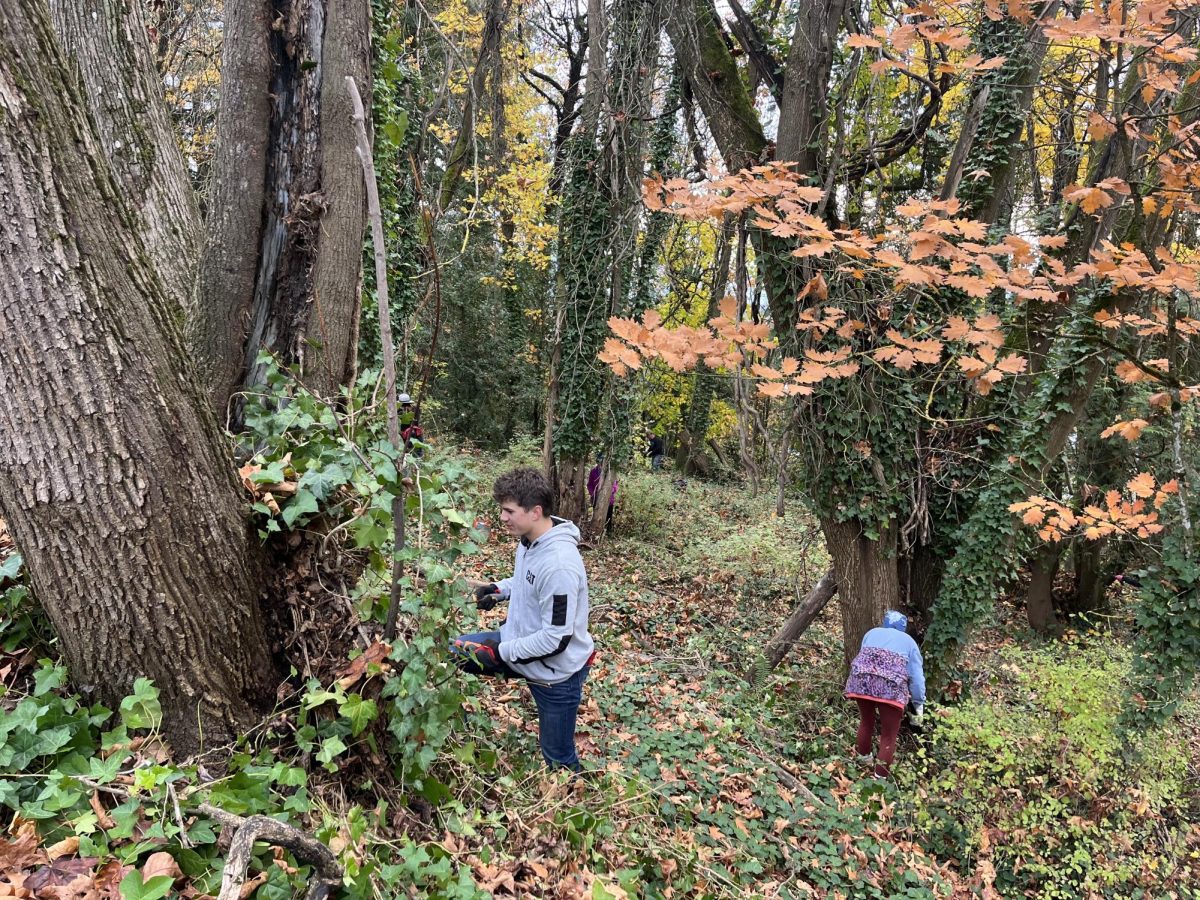English classes have involved reading novels and various other books for a long time. The current lineup of books features engaging and often socially relevant stories; this brings forth the question, how do these books get selected? As well as inviting curiosity into how students and teachers view their reading materials.
At Camas High School, the English department heads are the primary selectors of required reading material (anchor texts): these are read by all students of a given grade level. Then, there is a list of optional texts that individual teachers can choose from in addition to the anchor texts. English Department Head and English teacher Mrs. Lindsay Peters states “Usually it depends if there’s money to buy books, then we have to go through a process– this last round we had English teachers read a whole bunch of books, and narrow down the selection. Then we had to make recommendations that had to be approved by the district, and then they were purchased and we started making units for them.”
Certain texts may contain content that could be questionable for students to read; when asked what the process is for restricting these texts, Peters stated: “We do have a committee that reviews materials that we talk about, and if there’s cussing or a sexual instance or violence– we do have books that have that stuff because that’s real life, and a lot of teenagers are ready to handle that– but we have to have a justifiable reason for why– so it has to contribute in some way to the story or the character learning that we hope takes place” The latest list of approved materials can be found on the Camas High School website. Additionally, within those lists is a slew of further information regarding learning objectives and key concepts, much of which explains the reasoning behind interacting with texts in class.

The intention of books chosen for English classes revolves around reading comprehension and the central ideas represented. Many of the novels chosen highlight important socio-political issues, allowing discussion, interpretation, and broadening perspectives on the variety of topics covered. When asked what makes a good book for English classes, teacher Mr. Tom Sawyer stated: “There’s a lot of different things, I think it’d be more about balance of the books, you know, not just a single book is good because everyone’s gonna have different interests, but you need to find something for people to connect to; if I don’t connect to Lord of the Flies then maybe I’ll connect to something else… And I think the other thing that’s important really is how they teach it. If the teacher doesn’t enjoy teaching it, everyone’s gonna know, and it’s not as good.” English teacher Mrs. Ruhiyyih Wittwer stated, “It has to be something kids can relate to… It has to have issues for discussion– I want there to be something that’s more than just fluff; I want there to be something that’s deep and gritty and makes you question yourself and question the world around you. I think it has to have those themes and those topics to make it worthwhile…”
When asked for the favorite book she read as part of an English class, Sophomore Ella Hieronymus stated: “I think my favorite was The Hate U Give because not only was it an amazing book, but it brought up topics relevant to us and was written in a time that I can really put myself in. I think I enjoyed it much more than books set in different places or times, it clicked with me.”
Regarding the choice of books for English classes, Sophomore Liam Martin stated: “I personally enjoy the books we’ve read so far, but I think we should also be exposed to more ‘classic’ literature. I mean we’ve done Shakespeare, but other than that we’ve mostly read books that have caused a stir more recently– which is important, but older literature is incredibly important as well”
Sophomore Tomer Dagan states: “Our world is way different than that of those who came before us, so the books that we read need to adapt with that. There are few books that we read that are adapted more towards our time, it shouldn’t still be that most of the books we read are from an older generation.” When asked about his favorite book he responded: “I really enjoyed reading Anthem last year. However, there’s not really a book this year that I enjoy.”
Regarding favorite books, Wittwer states: “My favorite of all time is To Kill a Mockingbird because I absolutely love it, and I’ve done it so many times I feel like I know it really well… This year was the first time I taught The Hate U Give and I really, really enjoyed teaching that” she goes on to state how it is fresh and new: covering themes that are relevant in society; and how kids were able to more easily connect to the novel. The Hate U Give is featured as a new novel added to the lineup of required books this year.

When asked about his favorite book to read and teach, Sawyer stated: “To read and teach would be two different things of course. I really enjoy the stuff that we do with Lord of the Flies; I think it’s creative, it’s interactive, and it really gets the year off to a good start, so I always start with that. I really enjoy reading Into the Wild, but I enjoy teaching Lord of the Flies.”
The underlying idea of reading any material as part of the English curriculum, as stated by Wittwer: “The short answer is to be a better person; The longer answer is to gain experiences that help us become more empathetic and compassionate human beings. By being able to gain perspectives that we wouldn’t otherwise have been able to…” Sawyer explains: “I think it allows you, when you’re reading the novel, to start putting aspects of literature together. When you just go through short stories, you don’t have to put all that together– and then again, every teacher is different. Which I think is a good thing: They’re gonna be different when you get to college, and if you don’t connect with the way I’m doing it, well hopefully you connect with the next teacher that does it. It’s so different as far as this goes. I know for me it’s about teaching them to read critically, think critically, and to write.” The choices of texts by the English department definitely reflects these ideas.








































